Peterpan Syndrome Phenomenon : Self-Identity Crisis In Forming Intimation In Adult Man
Abstract
Keywords
Full Text:
PDFReferences
Barrie, J. M. (1995).Peter Pan. London: Penguin Popular Classics.
Boeree,C.G. (2017). Personality Theories. Yogyakarta:Ar-Ruzz Media
Chaplin,J.P. (2006). Kamus Psikologi. Jakarta: PT Rajagrafindo.
Crain, W. (2014). Teori Perkembangan, konsep dan aplikasi. Yogyakarta:Pustaka Pelajar.
Dalla,R.L.,Marchetti,A.,Sechrest,W.,White,J.L. (2010).” All the Men Here Have the Peter Pan Syndrome-They Don’t Want to Grow Up”:Najavo Adolescent Mother’s Intimate Partner Relationships-A 15 Year Perspective. Violance Againts Women 16 (7), 743-763.
Feist,J.,&Feist,G.J.(2010). Psikologi Kepribadian edisi 1 & 2. Jakarta:Salemba Humanik
Garcia, C.M. (2013). Peter Pan and the Horror of Becoming an Adult. Journal of Artistic Creation and Literary Research 1 (1), 16-27.
Johnson, C.C. (2016). Barries Traditional Woman: Wendy’s Fatal Flaw. Oglethorpe Journal of Undergraduate Research 6 (2)
Hedrick, J. (2017). Wendy’s Story in J.M. Barrie;s Peter Pan. Student Journal 1 (1).
Hobbs, B. (2013). When Syndromes Collide: Peter Pan and Pinocchio as Manifestations of the Quarterlife Crisis in John Beckman’s Bildungsroman, Winter Zoo. Journal of International Culture 6 (2), 1-26.
Hurlock, E. (2006). Psikologi Perkembangan. Jakarta: Penerbit Erlangga.
Killey, D. (1983). The Peter Pan Syndrome: Men Who Never Grown Up. Newyork:Dodd.
Merriam-Webster.com.(2019). “Definition of Syndrome”. Merriam-Webster. Tersedia pada://www.meriam-webster.com. Diakses pada 20 September 2019.
National Institute of Health. (2011). The Science of Adolescent Risk Taking:Workshop Report. Washington DC: National Academic Press.
Oltmanns, T.F., & Emery, R.E. (2012). Psikologi Abnormal edisi ketujuh. Yogyakarta: Pustaka Pelajar.
Papalia, Old & Feldman. (2011). Human Development. Jakarta: Penerbit Kencana.
Pervin,L.A.,Cervone,D.,&John,O(2010). Psikologi Kepribadian Teori & Penelitian edisi kesembilan.Jakarta:Kencana.
Perry, N.B., Dollar,J.M., Calkins, S.D., Keane,S.P.,& Shanahan,L. (2018). Childhood Self-Regulation as A Mechanism through which Early Overcontrolling Parenting is Associated with Adjustmen in Preadolescence. Developmental Psychology 54 (8), 1542-1554.
Quadrio, C. (1982). The Peter Pan and Wendy Syndrome: A Marital Dynamic. Australian and New Zealand Journal of Psychiatry 16 (2),23-28.
Robinson, O. ,Wright, Gordon R.T.,Smith, Jonathan A. (2013) The
holistic phase model of early adult crisis. Journal of Adult Development 20
(1), 27-37.
Rossi, N., & Mebert, J. (2011). Does A Quarterlife Crisist Exist. The Journal of Genetic Psychology 172 (2), 141-161.
Skorupa, A.,& Draga, P. (2012). Peter Pan Syndrome Among Mountain Climbers, Close Interpersonal Relationships Aspect. In Gwoździcka-Piotrowska (Eds), Academic Areas of Scientific Knowledge (pp109-122), Krakow: ALTUS.
Santrock, J.W. (2011). Life Span Development edisi ke dua belas. Jakarta:Penerbit Erlangga.
University of Granada. "Overprotecting parents can lead children to develop 'Peter Pan Syndrome'." ScienceDaily. ScienceDaily, 3 May 2007.
DOI: https://doi.org/10.24167/psidim.v18i2.2305
Print ISSN : 1411-6073 | online ISSN : 2579-6321 View My Stats

This work is licensed under a Creative Commons Attribution 4.0 International License.




















